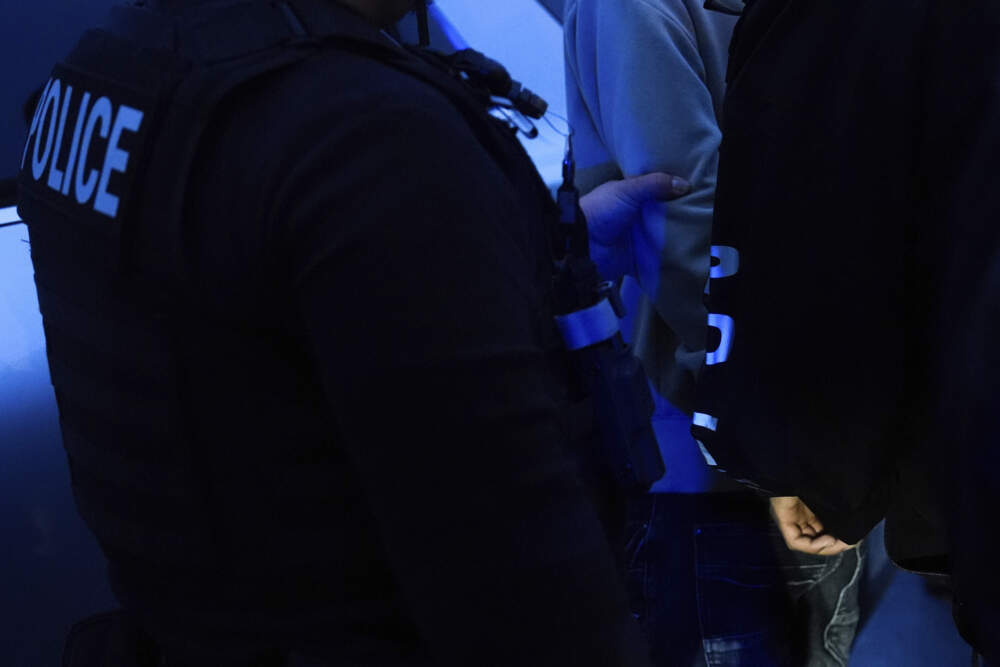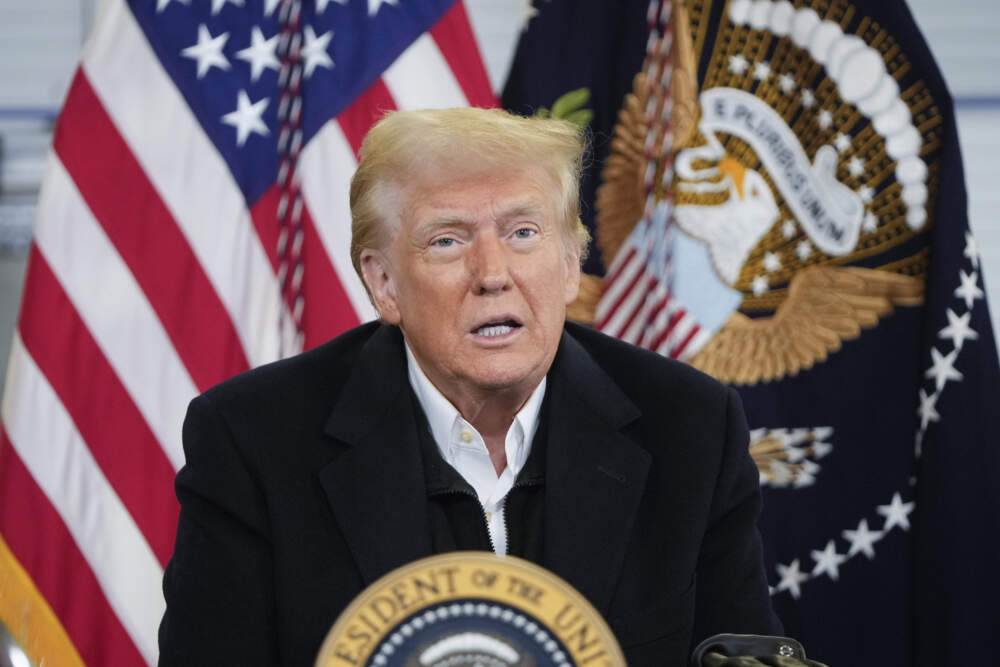Advertisement
Mass. officials digest new federal immigration policies and threats of prosecution
Massachusetts officials are reviewing the firehose of President Trump's new directives on immigration, including pressure to require local law enforcement to cooperate with federal agents and threats of prosecution if Trump's orders aren't followed.
A memo from the U.S. Department of Justice this week asked federal prosecutors to investigate state and local officials who get in the way of the president's immigration efforts. The memo raised questions about whether the U.S. attorney for Massachusetts — the top federal law enforcement official in the state — might prosecute local officials for not adhering to the president's orders.

Massachusetts U.S. Attorney Leah Foley was appointed by the Trump administration this week, and must be confirmed by the U.S. Senate. She said her office will follow the new federal directives.
“As the United States Attorney it is my obligation to support the policies of the Department of Justice, consistent with federal law," Foley said in a statement.
Yet, Massachusetts Attorney General Andrea Campbell issued a joint statement Thursday with attorneys general from 12 other states calling the Justice Department memorandum unconstitutional. The group said the federal government cannot order state law enforcement officials to carry out its mission.
The attorneys general said they will enforce their state laws and will not be "distracted by the president's mass deportation agenda."
They also said they will challenge any prosecutions of local officials.
"The President has made troubling threats to weaponize the U.S. Department of Justice's prosecutorial authority and resources to attack public servants acting in compliance with their state laws, interfering with their ability to build trust with the communities they serve and protect," the statement said. "Right now, these vague threats are just that: empty words on paper."
"Right now, these vague threats are just that: empty words on paper."
Statement from AGs, including Massachusetts Attorney General Andrea Campbell
In December, the nonprofit America First Legal, founded by Trump adviser Stephen Miller, sent a letter to Gov. Maura Healey warning of possible prison sentences if federal immigration orders are not carried out.
The letter said Massachusetts has been identified as a "sanctuary state violating federal law." The letter pointed to Healey's comments in December where she said "every tool in the toolbox" would be used to protect residents. America First Legal sent similar letters to more than 250 officials across the U.S.
The letters warn that officials "who support or enforce sanctuary laws, policies, and regulations have a very personal stake in the matter — you each could face criminal prosecution and civil liability for your illegal acts."
'Officials here follow the law'
Healey has been walking a fine line — asserting publicly that Massachusetts is "not a sanctuary state," while also saying immigrants' rights will be protected and local officials will follow the law.
Healey said she's not backpedaling from her promise that state police would not help federal immigration agents, insisting that local law enforcement will continue to protect public safety.
"Cooperation by my administration through the state police, by other local law enforcement, in Massachusetts, will continue with federal authorities and that's always been the case," the governor said. "Officials here follow the law."
Healey, who was the state's attorney general during the last Trump administration, said local officials are aware they could face criminal and civil penalties if they impede federal immigration enforcement.
As governor, Healey also has faced pressure over reports of crime in state emergency shelters where thousands of migrants are staying. She's taken steps to place limits on the shelter program, which for decades guaranteed housing for any unhoused families.
Advertisement
Local police and sheriffs have said that they do not help enforce federal immigration law. They say they will notify ICE if someone without legal status is in their custody, but they do not hold people on civil immigration detainers alone. The Massachusetts Sheriffs Association has reminded the state's sheriffs of the 2017 state Supreme Judicial Court decision.
Some towns and cities, including Boston, have laws on the books codifying that police are not to assist U.S. Immigration and Customs Enforcement in noncriminal matters. And officials in dozens of communities have pledged to protect people who are in the country without legal status and have passed laws declaring their communities sanctuaries.
Officials with the New England Regional Office of ICE have not responded to repeated interview requests by WBUR.
In response to the DOJ's memo, the American Civil Liberties Union has written to acting U.S. Attorney General James McHenry suggesting a meeting with "state and local officials against whom your agency has made these threats."
"The Trump administration’s assertions are legally unjustifiable and amount to a direct attack on the constitutional prerogative of every state and locality to opt out of federal immigration enforcement," the letter said.
Memos 'change the priorities'
Legal experts don't expect local officials to be hauled into court over immigration enforcement any time soon. Former federal prosecutor Brian Kelly said a local official would have to blatantly obstruct the feds for charges to be brought.
"Elected officials can say anything they want about different policies," Kelly said. "They have a right to take a different stand from the federal government and words are not going to get anybody in trouble. The issue is what actions get taken."
He pointed to the case of District Court Judge Shelley Joseph, who was charged with obstruction of justice for allowing a man to exit the back door of the Newton District courthouse in 2018 to escape ICE officers. The felony charges were dropped; the case was referred to the Massachusetts Commission on Judicial Conduct, which is considering sanctions against Joseph.
Kelly said the federal memo issued this week is a clarification of what the Justice Department expects from the new U.S. attorneys, which is a focus on cases involving immigration.
"Any memo out of Washington doesn't change what the law states or what the law is," Kelly said. "What the memos do is change the priorities."

President Trump's wide-ranging directives also call for things such as ending refugee resettlement, scaling back the program that allows some immigrants to temporarily stay in the U.S. while trying to obtain citizenship, and sending the military to U.S. borders. Many of the orders would require the help of local law enforcement.
Campbell, the Massachusetts AG, is among almost two dozen attorneys general who filed suit against the Trump administration this week over the president's executive order seeking to end birthright citizenship. A federal judge in Seattle has temporarily blocked the order, saying it's unconstitutional.
Many legal experts expect a series of court challenges over the White House initiatives. They argue some of what's coming from Washington now is "political theater" to scare officials into falling in line.
Daniel Kanstroom, a Boston College law professor, said some of the orders may be meant to simply send a message.
"It may be that the Trump administration is looking for a fight," Kanstroom said. "I do think courts are going to take a very close look at any criminal prosecution of this type, because it is enormously complicated how we police the boundaries between state and federal authority."
The orders are having an immediate effect on those in the immigrant community, where fear is quickly taking hold. Rumors of ICE arrests are rampant on social media, and some people in Greater Boston have been taken into federal custody. But immigration advocates say some of what's happening is not atypical.
"It generally aligns with practices ICE has historically carried out," said Ivan Espinoza-Madrigal, executive director of Lawyers for Civil Rights. "That said, the scope and scale of these operations appear to be increasing in both frequency and intensity. We understand that the Trump administration has accelerated this enforcement activity, which may continue in the coming days."
Advocates say although officials in several communities have issued notices that children can safely go to school and rights will be protected, the orders have created panic.
"My clients are very scared," said Sarah Sherman-Stokes, associate director of the Immigrants' Rights and Human Trafficking Program at Boston University School of Law.
"They're scared to send their kids to school. They're scared to go to the emergency room. Some of them are scared to go to work, because they have heard news of raids coming, especially here to Massachusetts."
